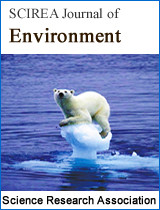Environmental Effects of Wastewater Use in Agricultural Irrigation at Dhamar City, Republic of Yemen
DOI: 298 Downloads 17464 Views
Author(s)
Abstract
The current research is designed to assess the impact of wastewater use on the soils, water resources and public health comparing with chemical, biological and physical analysis with local and international standards. One sample was collected from outlet of wastewater treatment system, ten ground water samples and eight soil samples were collected at 0-60m depth for physical and chemical laboratory analysis. The wastewater is relatively saline (1.7 dS/m), contain BOD and COD, 89.4 and 106 mg/l, respectively. The EC is relatively low (1711 μS/cm), TDS amounts is moderate (1112 mg/l) and the total coli form is very high (up to 78×106 CFU/100 ml). The groundwater and surface water analytical results showed that NO3 concentration and F. coli are higher than the WHO recommended and the soils are highly saline (>15 dS/m). In conclusion, the wastewater is considered unsuitable for irrigation use due to it’s a high risk on the surrounding environmental resources.
Keywords
Agriculture, Groundwater, Irrigation, Soils, Wastewater
Cite this paper
Ameen Yahya Rageh, Maged Ahmed Al-Garadi, Mohammed Hezam Al-Mashreki,
Environmental Effects of Wastewater Use in Agricultural Irrigation at Dhamar City, Republic of Yemen
, SCIREA Journal of Environment.
Volume 2, Issue 2, April 2017 | PP. 38-52.
References
| [ 1 ] | Abedi-Koupai, J., and Bakhtiarifar, A. (2003). Investigation of the effect of treated wastewater on hydraulic properties of emitters in trickle irrigation system. In: 20th Eur. Region. Conf., CD Int. Workshop, Irrigation technologies and method: Research, development and testing, Montpellier, France. |
| [ 2 ] | Al-Nabhani, S.N. (2000). National Water Strategy. Watershed Management and Wastewater Reuse in Peri-urban Areas of Yemen. GCP/YEM/026/NET, FAO. |
| [ 3 ] | Bazza, M. (2000). Irrigation Techniques Introduced by Land and Water Conservation Project and their Impact on Water Savings. Sana’a- Republic of Yemen/ REP. |
| [ 4 ] | Bruggeman H.Y (1997). Agro-climatic resources of Yemen. Part 1. Agro-climatic inventory. FAO project GCP/YEM/021/NET Field document 11. AREA, Dhamar, Republic of Yemen |
| [ 5 ] | Essafi, B.(2000). Development of Participatory Research/extension Systems for on-Farm Water Management Improvement, Mission Report, FAO. |
| [ 6 ] | FAO.(`988). Physical and chemical methods of soil and water analysis; Bulletin No. 10; FAO Rome. |
| [ 7 ] | FAO.(1985). Water quality for agriculture> R.S Ayers and D.W. Westcot. Irrigation and drainage. Paper No 29. Rev. 1. FAO, Rome:174. |
| [ 8 ] | Gijzen, HJ. (2002). Anaerobic digestion for sustainable development: a natural approach. Water Science and Technology 45(10): 321-328. |
| [ 9 ] | Jorda´n., M., M., Navarro-Pedren˜o J., Garcı´a-Sa´nchez. E., Mateu. J. Juan. P. (2004). Spatial dynamics of soil salinity under arid and semi-arid conditions: geological and environmental implications. Environmental Geology. (45): 448–456. |
| [ 10 ] | Metcalf, & Eddy, I.( 2003). Wastewater engineering. Treatment and reuse. International edition: McGraw-Hill. |
| [ 11 ] | Naji, Abu-Hatim, and Ahmed S. M.(2009). Participatory Irrigation Management and Cost-Sharing in Yemen. In Water in the Arab World: Management Perspectives and Innovations, ed. N. Vijay Jagannathan, Ahmed Shawky Mohamed, and Alexander Kremer, 367-382. Washington D.C.: World Bank. |
| [ 12 ] | Rageh, A. (2012). Environmental Impact Assessment Study of Treated Wastewater and its use for Agricultural Irrigation (forage- crops-livestock). Technical report, Dhamar /Yemen. |
| [ 13 ] | Rageh, A. (2014), Impacts assessment of treated wastewater use in agriculture irrigation in Amran area, Republic of Yemen/ REP. |
| [ 14 ] | Rusan M, Hinnawi S, and Rousan L (2007). Long term effect soil and plant quality parameters. Desalination:143-152. |
| [ 15 ] | WHO. (2006). A compendium of standards for wastewater reuse in the eastern Mediterranean region. Regional office for the eastern Mediterranean and regional center for environmental health. |
| [ 16 ] | WHO. ( 1989). Health Guidelines For The Use Of Wastewater In Agriculture And Aquaculture. Technical Report No 778, Report of a Scientific Group, Geneva 74. |
| [ 17 ] | Atroosh.K, (2010). Irrigation Advisory Services in Yemen. AREA, Dhamar, Republic of Yemen. |
| [ 18 ] | Yemeni Standards ( 2001). Irrigation Water, No.150,Yemen. |

